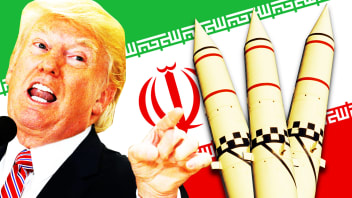
For his supporters, Donald Trump is embarking upon the vast undertaking of restoring a bygone era. For the very motivated and mobilized one-third of America that would support the blond populist millionaire to the end, this restoration requires a methodical and systematic demolition of the previous president’s legacy.
If it came from Barack Obama, it’s bad, it’s evil, it’s from the devil … and should be denounced, combatted, dismantled.
It’s evident in the decrees on “Muslim” immigration and the attack against the naturalization of immigrant children, which was an important cause for Obama. It’s evident in Congress’ repeated failed attempts to abolish the former president’s health care law.
And these days it’s evident in the White House’s assault on NAFTA and on the 2015 agreement limiting and regulating Iran’s nuclear program, which was a rare diplomatic success for the outgoing administration.
In all of these cases, it is notable that there is a world of difference between the staggering promises made by Candidate Trump (“All of this will be erased with a wave of a magic wand!”*) and the actual actions taken by President Trump.
Confronted by reality, Trump either hasn’t wanted to or – more likely – hasn’t been able to successfully complete his demolition projects. The obstacles have been multiplied by the courts, civil society, and a Congress that is more unruly than he could have imagined, and – we must not forget − the simple opposition of reality.
That’s not to say that several of his projects won’t succeed. Trump can still succeed in exploding Obama’s health care law, NAFTA, or the international agreement on Iranian nuclear power. But it’s clear that the opposition is stronger than anticipated.
What, in particular, will happen to the agreement on Iranian nuclear power that Trump “decertified” on Friday, once again accusing Iran of having violated the spirit of the deal?
For Trump, Tehran is not in compliance with its obligations as negotiated in Geneva and signed in Vienna in July 2015. He has – without actually doing so – threatened to cancel the agreement and has instead asked Congress to address the deal’s many serious flaws.
Trump’s approach in this matter, as in many others, is based upon an erroneous presumption of absolute power, be it that of the White House over the legislative process or that of the United States over the rest of the world. It is also based upon a boorish ignorance of diplomacy, of the text’s content, and of the real goal of the signed agreement.
Remember that the agreement on Tehran’s nuclear program is not a bilateral pact between Iran and the United States. The suspense created by the White House around the certification, or lack thereof, of Tehran’s compliance is a U.S. construction; it has nothing to do with an international obligation.
Moreover, even if the United States’ opinion on this agreement is important, Washington’s is but one signature of seven and the White House’s opinion has no legal authority on an international document validated by the U.N.
As for the “non-compliance” alleged by Trump, it has nothing to do with Tehran’s obligations outlined in the agreement.
According to general consensus – and first and foremost according to the International Atomic Energy Agency – Tehran has complied and continues to comply scrupulously with its obligations regarding dismantling, storage, production of fissionable material, inspections, etc.
Trump bears a grudge against Iran for reasons that have nothing to do with the agreement: because Tehran is a regional power in the Middle East (unbearable for Israel), has a conventional military program (missiles), intervenes in Syria (and also in Iraq … on the same side as Washington), represses women and dissidents, etc.
The 2015 agreement, a diplomatic miracle, rested precisely upon a strict dissociation between the actual nuclear aspects (preventing proliferation) and a supposed “general certificate of good conduct” granted (or not) to Iran. Because he hasn’t been able, or hasn’t wanted, to comprehend this, the “great demolisher” now risks triggering a second nuclear crisis, when North Korea should be receiving his full attention. But attention, as we know, is not Trump’s forte.
*Editor’s note: Although accurately translated, this quoted remark could not be independently verified.

Leave a Reply
You must be logged in to post a comment.